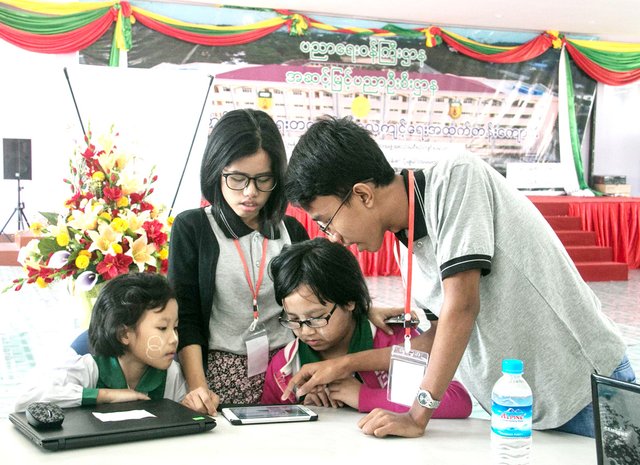Tech Education: An Effort in SE Asia to Teach Programming Skills to Children
Young students have been offered an opportunity to study basic computer programming.
This program is the first of its kind in government schools and was introduced by the Myanmar STEM Education Association.
In this article I will review a brand new program developed in Myanmar to teach young students how to do computer programming.
I've selected this topic because although most may not know this about Myanmar but the income gap in Myanmar happens to be one of the widest in the world. This is because a large proportion of the economy is controlled by supporters of the former military government. Furthermore, as of 2016, Myanmar ranks 145 out of 188 countries in human development, according to the Human Development Index.
The fact that they are beginning to teach software programming in schools is welcomed news and may be able to have an impact on bringing about better lives for the people of Myanmar.
So, lets take a look into this program in more detail here. The Hour-of-Code has been described as a global movement of computer programming for children. It was recently introduced by the Myanmar STEM Education Association (MSEA) at the Practicing High School of Yangon University of Education in Kamayut township of Yangon on Tuesday.
Now this may seem like a publicity stunt and in some ways because its just getting going it does play that role. But the simple fact that an opportunity like this has been created provides a major possibility to increase social mobility in Myanmar.
It was a first for students of government schools in Myanmar. The school, which is Myanmar’s largest, has 7200 students, of which 380 students joined the event, according to headmaster Dr Moe Thu.
This is a large scale project and something that all countries in SE Asia could benefit from. I would guess that in a school of 7200 students very few of them actually have even basic computer skils and that's something that needs to change.
“Actually, the curriculum for Science, Technology, Engineering and Mathematics (STEM) is well known in developed countries’ classrooms. Computer programming is a part of STEM. That’s why I try to introduce this kind of special training for my students, even though we cannot have the whole curriculum for STEM,” Thu said.
Dr Moe Thu said that she became passionate and inspired to build a full training program in computer programming for children after attending a competition event of ASEAN students for STEM in Vietnam last year.
“I saw a lot of children from ASEAN countries being very familiar with STEM education but Myanmar’s children are not. In other countries, Hour-of-Code is taught through weekly or daily lessons at formal schools. But in Myanmar, I cannot make this kind of classroom schedule for students because it is not included in the official curriculum of the Government. So I tried a compromise by teaching computer programming for my students,” she said.
What we are looking at here is a very logical chain of events taking place. It doesn't take a genius to figure out that a greater focus on learning skills in school as opposed to random facts and memorized content will result in creating better lives. Active learning has too long been neglected in education but for teachers in training in modern education programs it is pitched as the most important factor in creating successful lessons. What this means is that in fostering a true learning experience one can not only present new information but they must also allow students to apply it in new, interesting and creative ways.
The best learning takes place when there is a clear objective and reason to learn something. Computer skills are extremely important in this new technological age we are living in. I want to see these skills being developed at a more rapid pace in developing countries to give the people of these countries a better shot at real social mobility and better lives.
Another teacher from MSEA, Ma Keemoe, had a few more things to add based on this topic. Keemoe said that children are very interested in coding but the main factor that keeps them from learning is that most of the training materials are written in English and that presents a significant language barrier.
“In international school, children speak English, so we don’t need to explain the coding vocabulary like ‘keep forward’ but for Burmese-speaking children, we need to explain. The rest of the training is okay because they are happy to learn,” she explained.
A few more things that should be added include the fact that the Hour-of-Code has not been aimed at developing the level of skill required for a professional carrer in coding but it may present a valuable gateway in learning the logic of computer programming. These thoughts make a lot of sense to me and beyond giving students a basic understanding of computers and how computer programming works it may also inspire them to go further in this direction and actually develop the skills required to pursue a professional career in this field.
“It looks like playing a game for children but in fact it is computer programming. So, the children might familiarize with the logic of coding while they are playing. And the training needs only a very short time like one or two hours,” Ma Keemoe said.
Finally it's important to note that the Hour-of-Code has now become a global movement implemented in more than 180 countries focused around teaching computer programming to children and improve their logic and analytical skills.
So what can we expect to come from this new Hour-of-Code initiative? Personally I think its a big step in the right direction and needs to be supported and built upon feverishly by educators and administrators across the world.
In order to foster social mobility which basically means a pursuit of income equality for people living in developing countries, the quality of education must be improved significantly.
What do you guys think about this new Hour-of-Code program? Do you think we will see computer programming classes being offered in SE Asian schools in the near future?
Thanks for reading.
Authored by: @techblogger
In-text citations sources:
Hour-of-Code introduced at Myanmar’s biggest school - MM Times
Image Sources: MM Times





This is nice, useful and wonderful topic. And I always like these topics and looking for them, thank you and waiting for your next topics accept my words
Appreciable work done by you...
Thanks for helping others
A very good development for Myanmar, this will help alleviate computer illiteracy and also reduce capital flight. I hope it is also a sustainable development that will see generations benefits greatly from. Thank you for the article. I wish every nation can put in this
I love Hour-of-Code! We have a Bring Your Child to Work Day on Thursday. I'm leading our Hour-of-Code for the kids. We are doing this one.
https://hourofcode.com/mchoc
Everyone loves mind craft right?